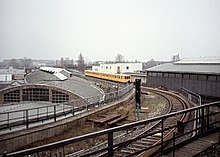Operating route
Operating route (in Switzerland: service route) is the name for a railway line that does not serve general traffic, but has a purely internal function. Operating lines (in Switzerland: service contact line ) can also be found in trolleybus networks.
characterization
Of operating routes is mainly in the area of local public transport , so when road and subway systems spoken, but also in upland, island and other small and narrow gauge railways. The term is less common in the railway sector.
Operating routes are, for example, entrances to the depot or connecting tracks between two underground lines that are not used in regular service.
Examples
Berlin subway
- Former tracks of the Gleisdreieck junction were used as connections between lines A and B after its reconstruction .
- The former AIII line (from 1966: Line 5) has served since the U7 went into operation in this area as a connection between the small-profile and large-profile networks used by work vehicles .
- The connecting tunnel built in 1952 from line A (small profile) to the connecting tunnel of lines D and E (large profile), a former investment ruin (tunnel of line D not in operation), was used until the 1990s to transport small profile vehicles into the to bring the Friedrichsfelde workshop that can only be reached via the large-profile route .
- Other connecting tracks exist z. B. at the stations Leopoldplatz (between U6 and U9 ) and Hermannplatz (between U7 and U8 )
Frankfurt subway
- From the corner of Eckenheimer Landstraße / Marbachweg (B-route) the single-track route of the former tram line 13 leads to Eschersheimer Landstraße, where it connects at the Dornbusch station to the A-route, which is also at street level.
- A double-track operating route leads from the tram route of line 12 from the Ratsweg intersection via “Am Riederbruch” to the route of the U7 directly at Erlenbruch / Frankfurter Volksbank-Stadion and from there to the Ost depot. With the exception of the evening hours, when passengers are also allowed to ride to the Johanna-Tesch-Platz / Volksbank-Stadion stop , the almost 500 m long route is purely an operational route.
- A circular tram line leads from the Zoo stop around the green areas of Alfred-Brehm-Platz . This is used as a turning system and waiting position for diverted trams ending at the zoo and for changing the direction of the Ebbelwei-Express .
- To the north of the “Heerstraße” tram station, the operating line branches off to the VGF's central tram workshop. The workshop can only be reached by rail vehicles via this operating route.
Paris metro
- The Voie navette and the Voie des Fêtes between Porte des Lilas stations ( line 3bis ) and Pré Saint-Gervais ( line 7bis ).
- The Voie Murat with the Porte Molitor station that was never opened .
- An approximately two-kilometer underground, single-track operating route leads from the Anvers station on line 2 to the Gare du Nord station on line 4 .
Nuremberg tram
- With the opening of the U2 to Herrnhütte , the connection from Rennweg via the northeast train station to Ziegelstein was discontinued on January 28, 1996; it remained as an operating line to the northeast depot until March 5, 2001.
- Due to dilapidation, the Tristanstraße – Bayernstraße section of line 7/8, which ran through a tunnel, was closed to passenger traffic from December 12, 2010. As the trains use the turning loop in Bayernstraße , the Bayernstraße – Tristanstraße section is used without passengers.
- With the opening of the U3 to Friedrich-Ebert-Platz , the connection from Rathenauplatz to Friedrich-Ebert-Platz for passenger services on line 9 was discontinued, but it will continue to exist as an operating route.
Toronto Tram
- Line 512 along St. Clair Avenue is only connected to the rest of the network over a 1.3-kilometer operating route.
Stuttgart rack railway
- A short section of the old line (from 1884 to 1936) is now used as an operating line to and from the depot.
Translohr Shanghai
- The only Tramway sur pneumatiques (Zhangjiang Tram, System Translohr ) in Shanghai to date has an approximately 300-meter-long single-lane operating route. It starts between the eastern terminus of Zhangdong Road Jinqiu Road Station and the following stop and leads from there to the depot.
Trolleybus Zurich
- The route Hegibachplatz - Sempacherstrasse - Klusplatz serves as a connection between the isolated line 34 and the main network.
Narrow gauge railway
- The Meiringen-Innertkirchen-Bahn in Switzerland is connected to the Brünigbahn (same gauge ) over a short distance . Until December 2010 this was an operating line (not electrified due to different driving voltages). Since then, the MIB trains have started and ended at Meiringen station, making the section a regular line.
literature
- Ulrich Lemke, Uwe Poppel: Berlin subway . Alba-Verlag, Düsseldorf 1992, ISBN 3-87094-346-7
Individual evidence
- ↑ Ulrich Lemke, Uwe Poppel: Berliner U-Bahn, p. 56
- ^ Christoph Groneck: Metros in France . 1st edition. Robert Schwandl, Berlin 2006, ISBN 3-936573-13-1 , p. 8 .
- ^ Jean Tricoire: Un siècle de métro en 14 lignes. De Bienvenüe à Météor . 2nd Edition. La Vie du Rail, Paris 2000, ISBN 2-902808-87-9 , p. 337 .
